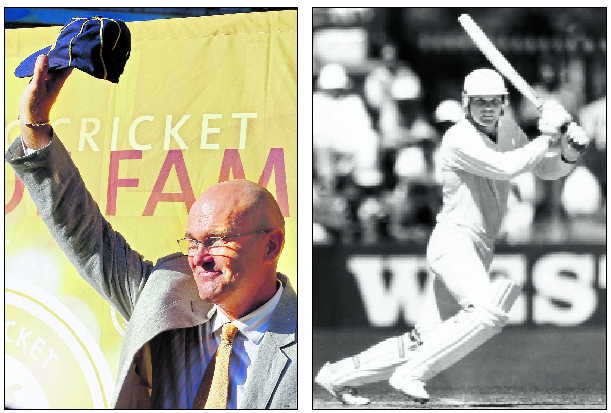Wellington, March 3
Former New Zealand cricket captain Martin Crowe has died at age 53 after a long battle with cancer.
“It is with heavy hearts that the family of Martin Crowe, MBE advise his death,” a statement issued by his family said. “Diagnosed in September 2014 with terminal double hit lymphoma he passed away peacefully today, Thursday 3rd March in Auckland surrounded by family. The family request privacy at this time.”
Widely regarded as New Zealand’s finest batsman, Crowe played 77 Tests from 1982-1995 and scored 5,444 runs at an average of 45.36. The elegant right-hander also scored 4,704 runs at an average of 38.55 in One-day Internationals.
Described as New Zealand’s finest batsman, Crowe’s cricketing life was defined by one innings, one tournament and one seriously damaged knee. Crowe was born into the game. His father Dave was a stalwart of the Cornwall Cricket Club in Auckland, while his elder brother Jeff followed him into the New Zealand side.
Fluent at the crease with all the time in the world to play shots, he broke into the Auckland team as an 18-year-old where he scored 51 in his first innings against Canterbury. Crowe’s precocious talent was rewarded 12 months later when he made his Test debut against an Australia side containing the snarling menace of Jeff Thomson and Dennis Lillee.
The experience of being a batting prodigy would leave him with mental scars, however, and he later wrote in the second of his autobiographies, Raw, in 2013 that being thrust into the limelight as a teenager had not allowed him to mature.
He said he also struggled with doubt and emotional instability in his early years, which left him feeling “scared and bewildered”. Crowe returned to the national side in 1983 and had a brilliant season for Somerset the following year, scoring 1,870 first class runs.
He was named one of Wisden’s Cricketers of the Year in 1985 and his 188 against Australia in November that year established him as one of New Zealand’s best batsmen. His finest hour with the bat, however, came in 1991 when he combined with Andrew Jones in a stand of 467 runs to save the first Test against Sri Lanka, scoring 299 before being caught behind from the slow medium pace of Arjuna Ranatunga.
His captaincy during the 1992 World Cup cemented his legacy. Crowe used innovative tactics, such as opening the bowling with off-spinner Dipak Patel, while constantly rotating his bowlers and changing fields to put pressure on batsmen.
But a knee injury that had been bothering him for several years began to affect him more and more, and Ken Rutherford assumed the captaincy as Crowe battled to recover from surgeries.
The injury brought his career to an end in 1995 after 77 Tests and 143 ODIs. He finished with 5,444 Test runs at 45.36 with a high score of 299 and 17 centuries, which is still the most by a New Zealand batman. He scored 4,704 ODI runs at 38.55.
Even in retirement Crowe was always thinking about the game. He pioneered a shortened version called ‘Cricket Max’ in the late 1990s, which is considered a precursor to the current Twenty20 format.
He also carved out a successful television production career but left the job in 2012 after falling out with senior management, and shortly after that he went public with his first diagnosis of cancer. Crowe threw himself into mentoring current batsmen Ross Taylor and Martin Guptill and was immensely proud of their performances at last year’s World Cup where New Zealand made the final, something his side failed to do in 1992.
“My precarious life ahead may not afford me the luxury of many more games to watch and enjoy,” Crowe wrote before Brendon McCullum’s side played the final. “So this is likely to be it. The last, maybe, and I can happily live with that.” — Reuters
Tributes to a great
- Very sad to hear of the passing of Martin Crowe this morning. An inspiration to me and many others. — Stephen Fleming, ex-nz captain
- RIP Martin Crowe you will always be remembered. You were the BEST I ever bowled against and a top human being. — Wasim Akram, Pak fast bowler
- Technically he was absolutely fantastic. He had a presence at the crease... — Allan Border, ex-Aussie captain
- My champion, my hero, my friend. I will love you forever. RIP M.D.Crowe. — Russell Crowe, actor (cousin)
- We had our tussles in the middle but he was always the first bloke through the door for a beer at the end of the day. — Craig McDermott, ex-Aussie pacer
- Saddened to hear of the passing of a great cricketer Martin Crowe — the best New Zealand captain I played against. — Imran Khan, ex-Pakistan captain
- There were occasions when Sachin and me actually copied him, he was one of my favourite batsman. — Sanjay Manjrekar, ex-India batsman
- RIP Martin Crowe, an absolute legend and an iconic star... My deepest condolences to his family and friends. — Virat Kohli, indian test captain
- Heartfelt condolences to family and fans of Martin Crowe. Great cricketer and a fighter till the very end. — Sachin Tendulkar
Unlock Exclusive Insights with The Tribune Premium
Take your experience further with Premium access.
Thought-provoking Opinions, Expert Analysis, In-depth Insights and other Member Only Benefits
Already a Member? Sign In Now










